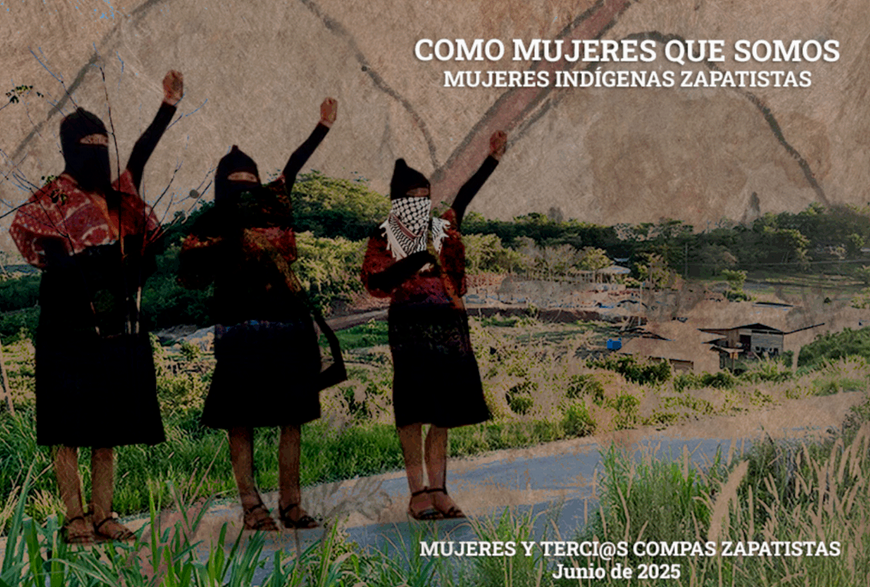
To the indigenous teachers of the CNTE.
In the audio of this video, you can hear a poem that, in a native language of Mayan roots, was presented at the arts encounter “RebelArte y RevelArte,” in April 2025. The poem presented by the 3 young Zapatista women from Caracol Jacinto Canek is called “Soy Mujer” or “I am a Woman” or “I am an Indigenous Woman,”, and was made with a previous work of investigation of what is talked about in the groups as women that we are in that zone. The poem is from the education promoters of that area who, in common, came up with the idea. They talked, but above all they listened to women who were already of age (of judgment, as we say here), their grandmothers and great-grandmothers; they talked to their mothers and older sisters; and they looked at themselves in the mirror of their being young Zapatista women today. Then they looked for who might present it and these young women joined in. The video shows images of the courses in Herbalism, Midwifery, Bonesetters and General Health, as well as the advances in the construction of the Quirófano and bicycle workshop, with the participation of Zapatista women compañeras.
In the translation of the compas of that puy it would be, more or less, like this:
“I am an indigenous woman / running into problems / in my gaze you see the gleam of sadness / in every step I take there is a trace, a mark / of the wounds that have made me, that have hurt me / men and capitalism. It’s not like being a rich woman / but it’s different / the rich also look down on me / just like men. I dressed as they wanted / to forget that I am woman that I am / the eye of man / turned me into a thing / that I am not worthy / that I am less / that I am weak, without strength / so that I am very unhappy / so I learned that life is shit / suffering led me to hate my body / to hate what I am / to forget that I am beautiful, beautiful / that entered my head. The word Zapatista became / like my best friend / or my salvation / today is my beginning / because I learned / to love myself as I am / and to love my being a woman / I learned that I was not born / to serve or to please men / or to obey someone / but I was born to love myself and to love myself / as the woman that I am / and I will not be happy until they stop exploiting me. Today I celebrate for being the woman that I am / for my courage / for my strength / because I have understood that I am a woman. From now on I will be a woman / with a firm step / determined to fight for life. My brave heart / beats with strength to be free / my heart, courage and strength / will help me to be free / with the butterfly / I will go forward / with my fighting spirit.”
But every female ear, another poetry.
Other Tzeltal-speaking compañeras, but from other areas (Tzeltal varies from one area to another) explain: “what the poem says is that she was sad, that she does not get through the day, that the rich despise her for being a woman and also the rich women treat her like she is a thing, not a person. In other words, being a rich woman is not the same as being a poor woman. And being a woman from the city is not the same as being an indigenous woman. The same goes for the men in her town, which is what we call machista.
Then, as pure sadness, she learned to hate herself, that’s how she got in her head, she hates her own body and she even forgot that she is beautiful. And then came the struggle and there she learned that there is nothing left but to fight and now she is learning other things and jobs. And her heart is happy that she is worth it, and that she is beautiful and that she has strength and courage, and that is why she has value as a woman. I believe that this poem was written by a compañera. A Zapatista, that is.
Maybe it is less seen, but when they end their participation with “Long live the women!,” they also shout, we shout, “Long live the Palestinian women!”.
For now that is all our word and our images as the women that we are.
From the mountains of the Mexican Southeast.
Indigenous Zapatista women.
June 2025.
Original text published at Enlace Zapatista on June 10th, 2025.
Translation by Schools for Chiapas.